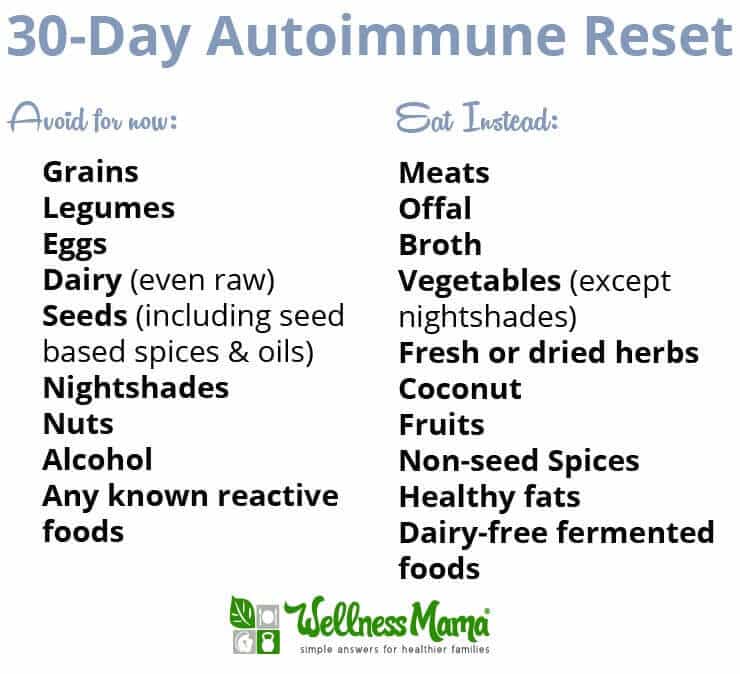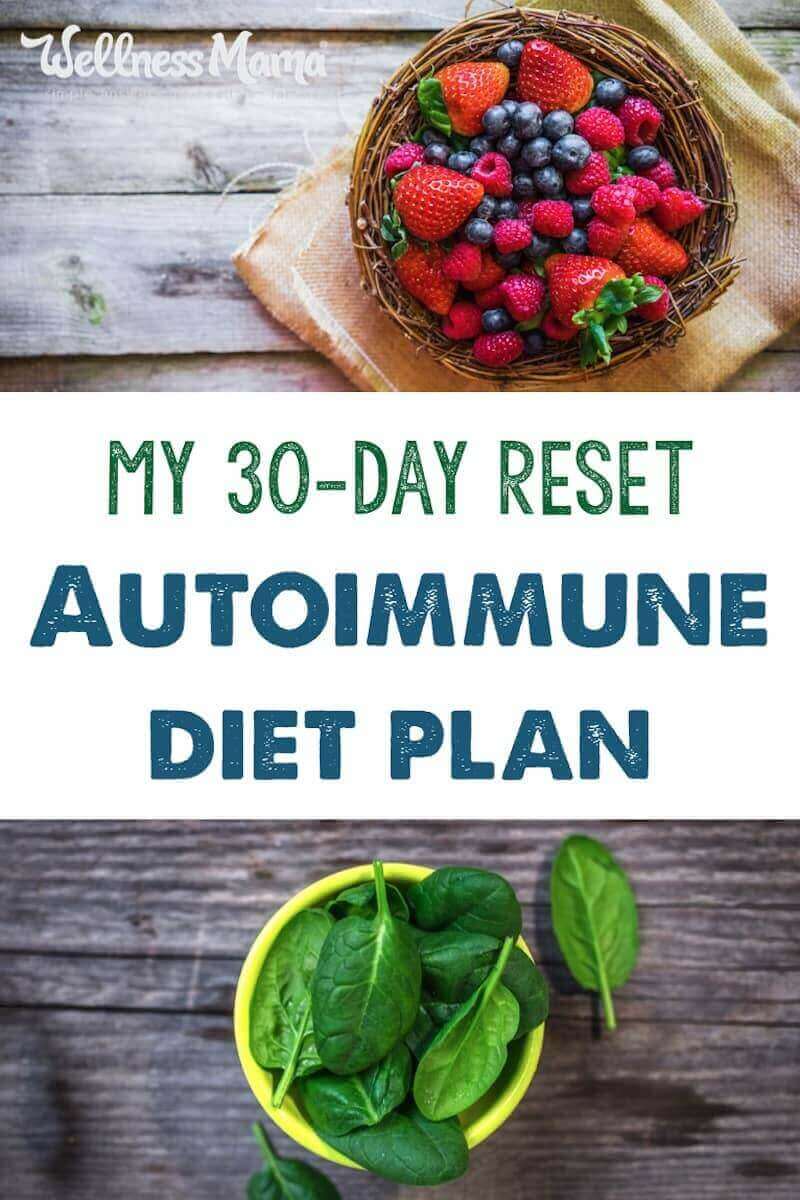
For many years I suspected that I had some form of thyroid problem based on my own research and symptoms like dry skin, occasional fatigue, trouble losing weight after having a baby, and hair thinning, but I was never able to get answers from conventional tests which showed that my T3 and T4 thyroid hormones were in the normal range.
Thankfully, I found an amazing doctor who specializes in hormones and endocrine problems and with additional blood testing and a thyroid ultrasound, he was able to finally figure out what I was struggling with: Hashimoto’s Thyroiditis (an autoimmune condition where the body creates antibodies to the thyroid).
What are Autoimmune Problems?
It turns out that many different disorders and diseases are autoimmune in nature but they manifest in different ways. As the Paleo Mom explains:
Autoimmune disease is caused by the immune system losing the ability to differentiate proteins belonging to your own body with proteins belonging to a foreign invader (like a bacteria, virus or parasite). What causes symptoms is the build up of damage to cells, tissues and/or organs in the body–damage caused by your own immune system attacking those cells. Which proteins/cells are attacked is what separates once disease from another. In Hashimoto’s Thyroiditis, the thyroid gland is attacked. In Rheumatoid Arthritis, the tissues of your joints are attacked. In psoriasis, proteins within the layers of cells that make up your skin are attacked. However, the root cause is the same.
Genetic predisposition to autoimmunity makes up about one third of your risk of developing an autoimmune disease. The other two thirds of your risk come from environmental factors, which include: diet, lifestyle, infections (both prior and persistent) exposure to toxins, hormones, weight, etc. While you cannot control your genetics or whether or not you had mono as a kid, you do have an immense amount of control over your diet and lifestyle (and the extent that these affect hormones and weight and even toxin exposure). By removing the foods that contribute to a leaky gut, gut dysbiosis (the wrong numbers, relative quantities, or types of microorganisms typically growing in the wrong locations in your gut), hormone imbalance, and that stimulate inflammation and the immune system, you can create the opportunity for your body to heal. By addressing important lifestyle factors and changing your focus to eating nutrient-dense foods that support optimal gut health (and optimal health of your gut microorganisms), that restore levels of important nutrients and provide all of the building blocks that your body needs to heal and properly regulate the immune system, that help resolve inflammation and support organ function, you create an environment in your body conducive to healing.
Why Other Diets May Not Work
From my understanding, once the body has an autoimmune reaction, it can sometimes be necessary to remove a wide variety of potentially inflammatory foods for a short time and then reintroduce to test the response. The idea is similar to the theory behind the GAPS protocol but geared toward addressing autoimmune issues instead.
Since the body is in a state of heightened immune response, removing these foods can help it get back into a state of balance and reduce the autoimmune reaction.
Technically, an autoimmune disease cannot be “cured”, but in many cases, it is possible to put the condition into remission with careful diet and lifestyle changes.
My Experience
I switched to an autoimmune protocol diet after being diagnosed with Hashimotos in hopes of giving my immune system a little time to recover. I was hopeful that it would be beneficial, but I was AMAZED at how quickly it helped. Within the first week, I saw my bloating go away, my thyroid nodule felt noticeably smaller, I had more energy (after the first couple of days), and my skin improved.
Over the course of the almost two months I did the strict protocol, I lost some of my stubborn weight and felt incredibly better. It also helped me identify foods that I was not responding well to, but that I didn’t realize were problematic (like eggs, which was confirmed by blood test later).
I was able to reintroduce many of the foods after that time without a problem and I felt continually better (until I created a flare by not sleeping and stressing about finishing my book). Sleep and stress are both huge factors in overall health and are especially important for those with any kind of health condition.
The Specifics of the Autoimmune Diet
The general idea of the autoimmune diet is that you are removing any potentially inflammatory foods, but the specifics are a bit more difficult. Some sources consider foods like fruit and sweet potatoes ok, while others do not. For reference, some sources that I find most helpful are:
- The Paleo Mom Website and her book The Paleo Approach (awesome if you really want to understand the research and the science)
This particular post from the Paleo Mom is really helpful in understanding what foods are considered safe and which ones to temporarily avoid.

I’ll also be posting more autoimmune friendly recipes and meal plans soon, but those are great resources for getting started. You can download the complete food list I used by clicking here (PDF).
It can seem overwhelming, but this way of eating is actually relatively simple if you follow a template. My typical day on the autoimmune diet was:
Breakfast– A scramble of meat and cooked vegetables, a cup of homemade bone broth, some fermented vegetables, and supplements.
Lunch– A huge salad with leftover protein (meat, offal or fish) and a small piece of fruit, a cup of bone broth, fermented water kefir or kombucha and olives.
Dinner– A stir fry with some type of protein (meat, offal, seafood) with a lot of vegetables and allowed spices, evening supplements and at least 1 cup of healthy starch like cooked winter squash, pumpkin, etc. I also made a lot of stuffed squashes and soups.
We rely heavily on big salads, stir frys and casseroles while on the autoimmune diet. When I first started, it seemed like I couldn’t eat anything and I was depriving myself of everything, but it is important to remember that many times the body is deficient in certain nutrients because of an autoimmune disease so during the course of the 30-day reset, I focused on extensively nourishing my body with as many high quality proteins, vegetables and healthy fats as I could consume. I may have been tired of my food choices at times, but I certainly never went hungry.
I also focused on consuming a TON of vegetables during this time, after talking to Dr. Terry Wahls and reading her book, The Wahls Protocol. Dr. Wahls emphasizes the importance of consuming at least 9 cups of vegetables a day, especially brightly colored vegetables, leafy greens, and onions and garlic.
Other Factors
Diet is hugely important for all aspects of health, and for me, it became even more important after being diagnosed with autoimmune disease, but it is by no means the only factor. Personally, I found that these factors were equally important to recovery for me:
- Sleep. It is my nemesis. I love to stay up late and skimp on sleep so I can get more done. My body does not love this. I’ve found that when I sleep at least 8-8.5 hours per night, I see my health markers improve (blood tests, fasting blood glucose, etc).
- Stress reduction. Also a tough one for me, but stress can have as much of an impact as diet on gut health and hormone levels. I found that even with a good diet, I started to notice symptoms creeping back in while under the stress of finishing my book.
- Supplements. I hesitated to include this part because if diet, stress and sleep aren’t under control, this won’t help at all, but I found certain supplements helped tremendously once I had optimized other factors. I personally take: WP-Throid thyroid medication (under the care of my doctor), Betaine HCL with protein meals, 5-MTHF and Methyl-B12, Folate, Probiotics, Fermented Cod Liver Oil, Cortisol support, Omega-3s, Vitamin D (and sunshine daily in the morning), Magnesium, L-glutamine, Gelatin, and Vitamin C. I would highly recommend seeing a good functional medicine doctor and finding out what you personally need before taking any supplements.
Autoimmune Diet Encouragement
This diet is difficult. So is pregnancy. Sometimes the best things in life require some work and denial of self. An elimination diet is temporary and it gives you a window into your own body and what you need to eat for optimal health.
Don’t let is cause you extra stress. Don’t let this keep you up at night. Try to focus on nourishing and loving your body and providing it with the building blocks it needs to function optimally. If you can, encourage a friend or family member to make the journey with you for support.
If you’ve ever struggled with autoimmune issues, take 30 days and give this a try to see if it helps you!
Do it with me! Are you in? Let me know below what your struggle is and the results you see!

Original article and pictures take cdn.wellnessmama.com site
Комментариев нет:
Отправить комментарий